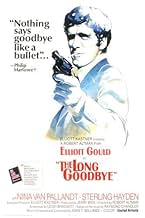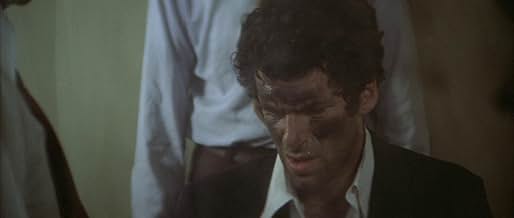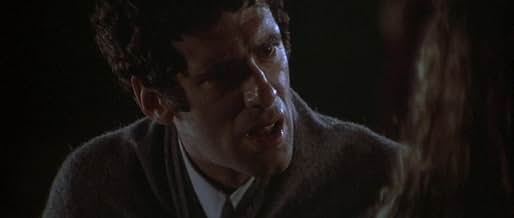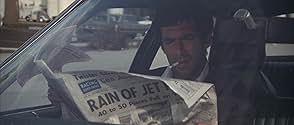L'investigatore privato Philip Marlowe tira un amico fuori dai guai e viene coinvolto nell'omicidio di sua moglie.L'investigatore privato Philip Marlowe tira un amico fuori dai guai e viene coinvolto nell'omicidio di sua moglie.L'investigatore privato Philip Marlowe tira un amico fuori dai guai e viene coinvolto nell'omicidio di sua moglie.
- Regia
- Sceneggiatura
- Star
- Premi
- 2 vittorie e 1 candidatura in totale
Stephen Coit
- Detective Farmer
- (as Steve Coit)
Vincent Palmieri
- Vince
- (as Vince Palmieri)
Pancho Córdova
- Doctor
- (as Pancho Cordoba)
Recensioni in evidenza
I admit, when I first viewed "The Long Goodbye", in 1973, I didn't like the film; the signature Altman touches (rambling storyline, cartoonish characters, dialog that fades in and out) seemed ill-suited to a hard-boiled detective movie, and Elliott Gould as Philip Marlowe? No WAY! Bogie had been perfect, Dick Powell, nearly as good, but "M.A.S.H.'s" 'Trapper John'? Too ethnic, too 'hip', too 'Altman'! Well, seeing it again, nearly 34 years later, I now realize I was totally wrong! The film is brilliant, a carefully-crafted color Noir, with Gould truly remarkable as a man of morals in a period (the 1970s) lacking morality. Perhaps it isn't Raymond Chandler, but I don't think he'd have minded Altman's 'spin', at all! In the first sequence of the film, Marlowe's cat wakes him to be fed; out of cat food, the detective drives to an all-night grocery, only to discover the cat's favorite brand is out of stock, so he attempts to fool the cat, emptying another brand into an empty can of 'her' food. The cat isn't fooled by the deception, however, and runs away, for good...
A simple scene, one I thought was simply Altman quirkiness, in '73...but, in fact, it neatly foreshadows the major theme of the film: betrayal by a friend, and the price. As events unfold, Marlowe would uncover treachery, a multitude of lies, and self-serving, amoral characters attempting to 'fool' him...with his resolution decisive, abrupt, and totally unexpected! The casting is first-rate. Elliott Gould, Altman's only choice as Marlowe, actually works extremely well, BECAUSE he is against 'type'. Mumbling, bemused, a cigarette eternally between his lips, he gives the detective a blue-collar integrity that plays beautifully off the snobbish Malibu 'suspects'. And what an array of characters they are! From a grandiosely 'over-the-top' alcoholic writer (Sterling Hayden, in a role intended for Dan Blocker, who passed away, before filming began), to his sophisticated, long-suffering wife (Nina Van Pallandt), to a thuggish Jewish gangster attempting to be genteel (Mark Rydell), to a smug health guru (Henry Gibson), to Marlowe's cocky childhood buddy (Jim Bouton)...everyone has an agenda, and the detective must plow through all the deception, to uncover the truth.
There are a couple of notable cameos; Arnold Schwarzenegger, in only his second film, displays his massive physique, as a silent, mustached henchman; and David Carradine plays a philosophical cell mate, after Marlowe 'cracks wise' to the cops.
The film was a failure when released; Altman blamed poor marketing, with the studio promoting it as a 'traditional' detective flick, and audiences (including me) expecting a Bogart-like Marlowe. Time has, however, allowed the movie to succeed on it's own merits, and it is, today, considered a classic.
So please give the film a second look...You may discover a new favorite, in an old film!
A simple scene, one I thought was simply Altman quirkiness, in '73...but, in fact, it neatly foreshadows the major theme of the film: betrayal by a friend, and the price. As events unfold, Marlowe would uncover treachery, a multitude of lies, and self-serving, amoral characters attempting to 'fool' him...with his resolution decisive, abrupt, and totally unexpected! The casting is first-rate. Elliott Gould, Altman's only choice as Marlowe, actually works extremely well, BECAUSE he is against 'type'. Mumbling, bemused, a cigarette eternally between his lips, he gives the detective a blue-collar integrity that plays beautifully off the snobbish Malibu 'suspects'. And what an array of characters they are! From a grandiosely 'over-the-top' alcoholic writer (Sterling Hayden, in a role intended for Dan Blocker, who passed away, before filming began), to his sophisticated, long-suffering wife (Nina Van Pallandt), to a thuggish Jewish gangster attempting to be genteel (Mark Rydell), to a smug health guru (Henry Gibson), to Marlowe's cocky childhood buddy (Jim Bouton)...everyone has an agenda, and the detective must plow through all the deception, to uncover the truth.
There are a couple of notable cameos; Arnold Schwarzenegger, in only his second film, displays his massive physique, as a silent, mustached henchman; and David Carradine plays a philosophical cell mate, after Marlowe 'cracks wise' to the cops.
The film was a failure when released; Altman blamed poor marketing, with the studio promoting it as a 'traditional' detective flick, and audiences (including me) expecting a Bogart-like Marlowe. Time has, however, allowed the movie to succeed on it's own merits, and it is, today, considered a classic.
So please give the film a second look...You may discover a new favorite, in an old film!
Private investigator Philip Marlowe is approached by a friend, Terry Lennox, who is in a bit of a jam. Marlowe helps him get to Mexico but the next day his friend's wife turns up dead. The police hold Marlowe but then release him once Terry Lennox is found dead in Mexico - suicide. To the cops it is an open-and-shut case of murder-suicide but Marlowe doesn't believe that to be the case. Marlowe then is hired by the wife of wealthy author Roger Wade to find her husband. The Wades were neighbours of the Lennoxes. A powerful mob boss also leans on him to find the large sum of money Terry Lennox was transporting for him. Could all these events be connected?
Robert Altman directs a movie based on a Raymond Chandler novel, and it's a mixed bag.
Starts off very well with some humorous scenes and dialogue and a fair amount of intrigue. The middle-to-end sections lack focus, however, and, while it is never dull, the movie feels like it is drifting to a lacklustre conclusion. The intrigue just seems to get sucked out of the movie in that segment. In addition, the theme song gets played in just about every situation and in various forms - it gets very irritating, very quickly.
Ends well though, with a good twist and a powerful conclusion.
A new take on Philip Marlowe from Elliott Gould - he is hardly Humphrey Bogart and he's not trying to be. Altman's Philip Marlowe is the dishevelled, anti-social chain-smoking anti-hero rather than the suave, confident hero that Bogart portrayed. For the most part, it works, though at times I wished for the coolness and wise-cracks of Bogie.
Supporting cast are fine. Sterling Hayden is great as the larger-than-life, Ernest Hemingway/John Huston-esque Roger Wade.
Not the Philip Marlowe of the Bogart movies, but it'll do.
Robert Altman directs a movie based on a Raymond Chandler novel, and it's a mixed bag.
Starts off very well with some humorous scenes and dialogue and a fair amount of intrigue. The middle-to-end sections lack focus, however, and, while it is never dull, the movie feels like it is drifting to a lacklustre conclusion. The intrigue just seems to get sucked out of the movie in that segment. In addition, the theme song gets played in just about every situation and in various forms - it gets very irritating, very quickly.
Ends well though, with a good twist and a powerful conclusion.
A new take on Philip Marlowe from Elliott Gould - he is hardly Humphrey Bogart and he's not trying to be. Altman's Philip Marlowe is the dishevelled, anti-social chain-smoking anti-hero rather than the suave, confident hero that Bogart portrayed. For the most part, it works, though at times I wished for the coolness and wise-cracks of Bogie.
Supporting cast are fine. Sterling Hayden is great as the larger-than-life, Ernest Hemingway/John Huston-esque Roger Wade.
Not the Philip Marlowe of the Bogart movies, but it'll do.
Elliott Gould offers up one of his most amusing performances as Raymond Chandlers' private eye character Philip Marlowe. Marlowe is visited in the wee hours of the morning by his friend Terry Lennox (baseball player Jim Bouton). He does his friend a favour by driving him all the way to Tijuana. Some time after that, he learns that, in fact, Terry's wife Sylvia is dead, presumably killed by Terry, who has also offed himself. Then he is hired for a supposedly simple case: find Roger Wade (Sterling Hayden), a boozy writer, for his wife Eileen (Nina van Pallandt). In the time-honoured tradition of detective fiction, Marlowe will discover that the separate stories turn out to be connected.
Filmmaker Robert Altmans' take on the whole Neo-Noir genre does take some getting used to. It's a lot more irreverent, and goofy, than some people will expect. Devotees of Chandler and classic film noir will likely be dismayed. Scripted by the legendary Leigh Brackett, the dialogue does flow from the mouths of the cast with real ease, and it is reasonably entertaining to watch as this thing develops. After a while, however, even a viewer such as this one can see where the story is headed.
Goulds' version of Marlowe is a real change of pace. He's a quirky, hip, unflappable wise-ass who's willing to head to an all-night supermarket to obtain the only brand of cat food that his pet will eat. And he's just one memorable character in this interesting stew of a film. Hayden plays his washed-up writer for everything that it's worth. Film director Mark Rydell ("The Rose") is clearly relishing his meaty acting role as a brutal Jewish gangster. Henry Gibson ("The Blues Brothers") is an effective weasel as a doctor who expects to be PAID for his services. Danish actress Van Pallandt is alluring as the femme fatale of the piece. And there are a couple of very familiar faces in small roles: Jack Riley ('The Bob Newhart Show'), Rutanya Alda ("Mommie Dearest"), David Carradine as a chatty convict, and even Arnold Schwarzenegger as one of Rydells' goons.
Set in a sunny but rather seedy California of the 70s (complete with spacey hippie neighbours for Marlowe), this is an entertainingly convoluted tale, and a rather slowly paced one, but it always remains...interesting. It's definitely an unusual spin on the typical noir film.
Seven out of 10.
Filmmaker Robert Altmans' take on the whole Neo-Noir genre does take some getting used to. It's a lot more irreverent, and goofy, than some people will expect. Devotees of Chandler and classic film noir will likely be dismayed. Scripted by the legendary Leigh Brackett, the dialogue does flow from the mouths of the cast with real ease, and it is reasonably entertaining to watch as this thing develops. After a while, however, even a viewer such as this one can see where the story is headed.
Goulds' version of Marlowe is a real change of pace. He's a quirky, hip, unflappable wise-ass who's willing to head to an all-night supermarket to obtain the only brand of cat food that his pet will eat. And he's just one memorable character in this interesting stew of a film. Hayden plays his washed-up writer for everything that it's worth. Film director Mark Rydell ("The Rose") is clearly relishing his meaty acting role as a brutal Jewish gangster. Henry Gibson ("The Blues Brothers") is an effective weasel as a doctor who expects to be PAID for his services. Danish actress Van Pallandt is alluring as the femme fatale of the piece. And there are a couple of very familiar faces in small roles: Jack Riley ('The Bob Newhart Show'), Rutanya Alda ("Mommie Dearest"), David Carradine as a chatty convict, and even Arnold Schwarzenegger as one of Rydells' goons.
Set in a sunny but rather seedy California of the 70s (complete with spacey hippie neighbours for Marlowe), this is an entertainingly convoluted tale, and a rather slowly paced one, but it always remains...interesting. It's definitely an unusual spin on the typical noir film.
Seven out of 10.
10faraaj-1
It's true. You can't have mixed feelings about The Long Good-bye; you'll either love it or hate it. I started the movie with what I pretended was an open mind, but a secret hope that I'd be fully justified in hating it. In my defense, The Maltese Falcon is my favorite movie and Bogie is my favorite actor. Noir is my favorite film genre and I love Howard Hawk's The Big Sleep wihich had Bogart as the definitive Marlowe.
Altman's take on Chandler's other book with private eye Marlowe, The Long Good-bye, updates the action to the 1970's. He introduces a very 70's theme song and finds as different an actor as he can from Bogart for the role of Marlowe. From the opening frame, Elliot Gould plays Marlowe like a push-over. He's a man who constantly mutters to himself, suffers nervous tics, can't even fool his cat, is afraid of dog's and seems to be the only man not attracted to his sexy hippie neighbors despite their friendliness towards him and obvious promiscuousness.
However, Gould really creates a unique persona with the way he walks, talks, wise-cracks and operates. He becomes a believable person - which is why the uncharacteristic ending is so impacting. The photography, especially the night scenes, are beautifully filmed. The theme music plays everywhere - a Mexican funeral, a doorbell, a car radio etc and with different singers. There are other layers of flesh added to the telling that really work - like the compound security guards impressions of James Stewart, Barbara Stanwyck, Cary Grant and best of all Walter Brennan aka Stumpy from Rio Bravo.
This movie worked great for me and the plot, intricate though it was, was understandable. I will not compare this Marlowe to Bogart's, but do find it admirable that Altman just stuck to the goal of making a good movie without trying to ape or make obvious references to the noir genre.
Altman's take on Chandler's other book with private eye Marlowe, The Long Good-bye, updates the action to the 1970's. He introduces a very 70's theme song and finds as different an actor as he can from Bogart for the role of Marlowe. From the opening frame, Elliot Gould plays Marlowe like a push-over. He's a man who constantly mutters to himself, suffers nervous tics, can't even fool his cat, is afraid of dog's and seems to be the only man not attracted to his sexy hippie neighbors despite their friendliness towards him and obvious promiscuousness.
However, Gould really creates a unique persona with the way he walks, talks, wise-cracks and operates. He becomes a believable person - which is why the uncharacteristic ending is so impacting. The photography, especially the night scenes, are beautifully filmed. The theme music plays everywhere - a Mexican funeral, a doorbell, a car radio etc and with different singers. There are other layers of flesh added to the telling that really work - like the compound security guards impressions of James Stewart, Barbara Stanwyck, Cary Grant and best of all Walter Brennan aka Stumpy from Rio Bravo.
This movie worked great for me and the plot, intricate though it was, was understandable. I will not compare this Marlowe to Bogart's, but do find it admirable that Altman just stuck to the goal of making a good movie without trying to ape or make obvious references to the noir genre.
I like the hard-to-solve mystery we get here. Actually, they don't even come close to giving us enough clues to solve it, hence the difficulty. But in that we feel we're up against it like the protagonist, detective Phil Marlowe, played by Elliot Gould.
Times have really changed for Marlowe since 1946, when he was played by Humphrey Bogart. Then he was cool, implacable, wore a fedora a lot, and wound up with babe Lauren Bacall. That was the only strain of the plot viewers could follow. There were some dead bodies, smoking guns, and tough questions from cops along the way.
In this movie it's 1973, and Marlowe still think he's cool but that opinion is not so widespread this time - he's being played for a sucker by at least half the cast, including a longtime friend, and his own cat. He unravels the mystery mostly out of a lack of having anything better to do, which he clearly stood in need of.
Director Robert Altman follows his own ideas about how to communicate visually. Like when he changes scene to a hospital, he doesn't do any kind of establishing long shot, he shows a closeup of a light over a patient's bed. His montages create a kind of equivalent of our human experience, where we use our minds to focus on detail. He usually winds up with scenes that feel like we're watching something actually happen. But he does know how to use visuals for dramatic power when he wants, as the ending makes clear.
Some of the performances he gets from actors are amazing, like Mark Rydell as psychotically dangerous gangster Marty Augustine. The way he works himself into a rage with his rants changes gears from funny to frightening at high speed, and I can't believe it didn't influence Joe Pesci's performance in "Goodfellas."
Not everything works here, like Gould smearing fingerprint ink on his face then breaking into Al Jolson at police headquarters, but on the whole a fairly engrossing take on detective mysteries.
Times have really changed for Marlowe since 1946, when he was played by Humphrey Bogart. Then he was cool, implacable, wore a fedora a lot, and wound up with babe Lauren Bacall. That was the only strain of the plot viewers could follow. There were some dead bodies, smoking guns, and tough questions from cops along the way.
In this movie it's 1973, and Marlowe still think he's cool but that opinion is not so widespread this time - he's being played for a sucker by at least half the cast, including a longtime friend, and his own cat. He unravels the mystery mostly out of a lack of having anything better to do, which he clearly stood in need of.
Director Robert Altman follows his own ideas about how to communicate visually. Like when he changes scene to a hospital, he doesn't do any kind of establishing long shot, he shows a closeup of a light over a patient's bed. His montages create a kind of equivalent of our human experience, where we use our minds to focus on detail. He usually winds up with scenes that feel like we're watching something actually happen. But he does know how to use visuals for dramatic power when he wants, as the ending makes clear.
Some of the performances he gets from actors are amazing, like Mark Rydell as psychotically dangerous gangster Marty Augustine. The way he works himself into a rage with his rants changes gears from funny to frightening at high speed, and I can't believe it didn't influence Joe Pesci's performance in "Goodfellas."
Not everything works here, like Gould smearing fingerprint ink on his face then breaking into Al Jolson at police headquarters, but on the whole a fairly engrossing take on detective mysteries.
Lo sapevi?
- QuizThe location for Roger Wade - Sterling Hayden's home was actually Robert Altman's home at the time.
- BlooperDuring the scene where Marlowe is chasing Mrs. Wade in her top-down Mercedes 450 SL convertible, the car goes from having head rests to having no head rests in various shots.
- Citazioni
Philip Marlowe: Nobody cares but me.
Terry Lennox: Well that's you, Marlowe. You'll never learn, you're a born loser.
Philip Marlowe: Yeah, I even lost my cat.
- ConnessioniEdited into El adios largos (2013)
- Colonne sonoreThe Long Goodbye
by John Williams and Johnny Mercer
Performed by The Dave Grusin Trio, Jack Sheldon, Clydie King, Jack Riley, Morgan Ames, Aluminum Band, The Tepoztlan Municipal Band
I più visti
Accedi per valutare e creare un elenco di titoli salvati per ottenere consigli personalizzati
Dettagli
- Data di uscita
- Paese di origine
- Lingue
- Celebre anche come
- Un largo adiós
- Luoghi delle riprese
- 2178 High Tower Drive, Hollywood, Los Angeles, California, Stati Uniti(Marlowe's residence)
- Aziende produttrici
- Vedi altri crediti dell’azienda su IMDbPro
Botteghino
- Budget
- 1.700.000 USD (previsto)
- Lordo in tutto il mondo
- 27.504 USD
Contribuisci a questa pagina
Suggerisci una modifica o aggiungi i contenuti mancanti


































